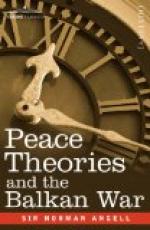In dealing with answer No. 4 I have shown how the inadequacy of our language leads us so much astray in our notions of the real role of force in human relationships. But there is a curious phenomenon of thought which explains perhaps still more how misconceptions grow up on this subject, and that is the habit of thinking of a war which, of course, must include two parties, in terms, solely of one party at a time. Thus one critic[3] is quite sure that because the Balkan peoples “recked nothing of financial disaster,” economic considerations have had nothing to do with their war—a conclusion which seems to be arrived at by the process of judgment just indicated: to find the cause of condition produced by two parties you shall rigorously ignore one. For there is a great deal of internal evidence for believing that the writer of the article in question would admit very readily that the efforts of the Turk to wring taxes out of the conquered peoples—not in return for a civilized administration but simply as the means of livelihood, of turning conquest into a trade—had a very great deal to do in explaining the Turk’s presence there at all and the Christian’s desire to get rid of him; while the same article specifically states that the mutual jealousies of the great powers, based on a desire to “grab” (an economic motive), had a great deal to do with preventing a peaceful settlement of the difficulties. Yet “economics” have nothing to do with it!
I have attempted elsewhere to make these two points—that it is on the one hand the false economics of the Turks, and on the other hand the false economics of the powers of Europe, colouring the policy and Statecraft of both, which have played an enormous, in all human probability, a determining role in the immediate provoking cause of the war; and, of course, a further and more remote cause of the whole difficulty is the fact that the Balkan peoples never having been subjected to the discipline of that complex social life which arises from trade and commerce have never grown out of (or to a less degree) those primitive racial and religious hostilities which at one time in Europe as a whole provoked conflicts like that now raging in the Balkans. The following article which appeared[4] at the outbreak of the war may summarise some of the points with which we have been dealing.
Polite and good-natured people think it rude to say “Balkans” if a Pacifist be present. Yet I never understood why, and I understand now less than ever. It carries the implication that because war has broken out that fact disposes of all objection to it. The armies are at grips, therefore peace is a mistake. Passion reigns on the Balkans, therefore passion is preferable to reason.
I suppose cannibalism and infanticide, polygamy, judicial torture, religious persecution, witchcraft, during all the years we did these “inevitable” things, were defended in the same way, and those who resented all criticism of them pointed in triumph to the cannibal feast, the dead child, the maimed witness, the slain heretic, or the burned witch. But the fact did not prove the wisdom of those habits, still less their inevitability; for we have them no more.




